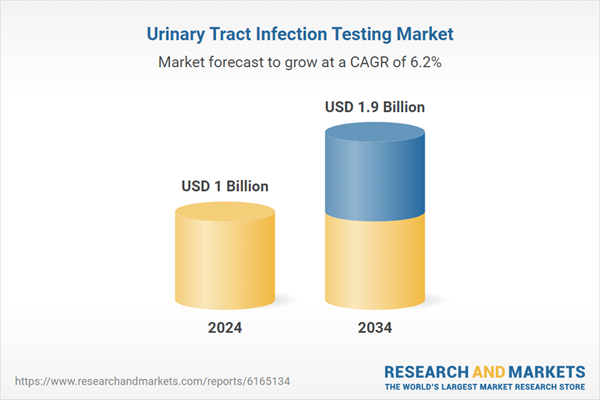UTI testing is a clinical process that helps detect infections in various parts of the urinary system, which includes the bladder, urethra, kidneys, and ureters. The growing need for early diagnosis and accurate treatment is pushing healthcare providers to adopt advanced testing kits that support effective patient outcomes. Continuous innovation in diagnostic methods is helping address the challenge of symptomless infections in early stages, promoting the wider adoption of these technologies and boosting market expansion across healthcare facilities.
The urinalysis segment was valued at USD 494.1 million in 2024 due to its affordability, availability, and diagnostic precision. Urinalysis remains the preferred preliminary test for detecting bacterial presence and guiding subsequent clinical decisions. The segment’s momentum is further accelerated by the growing elderly population, who face a higher risk of UTIs because of physiological changes and increased use of catheters and other interventions.
The cystitis segment held a 52.1% share in 2024. Cystitis is the most widespread UTI subtype, largely impacting women due to biological factors. Frequent recurrence among patients continues to drive repeat diagnostic testing, increasing the uptake of related testing solutions. In parallel, improved public awareness around early symptoms of cystitis, supported by educational health initiatives, is encouraging more individuals to seek testing, further accelerating segment growth.
North America Urinary Tract Infection Testing Market held a 36.4% share in 2024. This leadership is attributed to the region’s robust healthcare infrastructure, early adoption of advanced medical diagnostics, and a growing UTI patient population in both the US and Canada. Rising UTI cases - particularly among older adults, women, and individuals with long-term health conditions - are contributing to the sustained expansion of the UTI testing industry in the region.
Key companies active in the Global Urinary Tract Infection Testing Market include Siemens Healthineers, ACON Laboratories, Cardinal Health, Quest Diagnostics, Thermo Fisher Scientific, Bio-Rad Laboratories, Abbott Laboratories, F. Hoffmann-La Roche, Labcorp, Randox Laboratories, Focus Laboratories, and Mankind. To solidify their market position, leading players in the urinary tract infection testing space are focusing on advancing diagnostic accuracy and speeding up testing turnaround times through automation and digital integration. Strategic partnerships with healthcare providers and diagnostic labs are expanding product availability and customer reach. Companies are also heavily investing in R&D to develop rapid testing kits and point-of-care devices that support early-stage detection. Emphasis is being placed on developing high-sensitivity assays and molecular tests that deliver reliable results even in asymptomatic cases.
Comprehensive Market Analysis and Forecast
- Industry trends, key growth drivers, challenges, future opportunities, and regulatory landscape
- Competitive landscape with Porter’s Five Forces and PESTEL analysis
- Market size, segmentation, and regional forecasts
- In-depth company profiles, business strategies, financial insights, and SWOT analysis
This product will be delivered within 2-4 business days.
Table of Contents
Companies Mentioned
The key companies profiled in this Urinary Tract Infection Testing market report include:- Abbott Laboratories
- ACON Laboratories
- Bio-Rad Laboratories
- Cardinal Health
- F. Hoffmann-La Roche
- Focus Laboratories
- LabCorp
- Mankind
- Quest Diagnostics
- Randox Laboratories
- Siemens Healthineers
- Thermo Fisher Scientific
Table Information
| Report Attribute | Details |
|---|---|
| No. of Pages | 134 |
| Published | August 2025 |
| Forecast Period | 2024 - 2034 |
| Estimated Market Value ( USD | $ 1 Billion |
| Forecasted Market Value ( USD | $ 1.9 Billion |
| Compound Annual Growth Rate | 6.2% |
| Regions Covered | Global |
| No. of Companies Mentioned | 13 |









